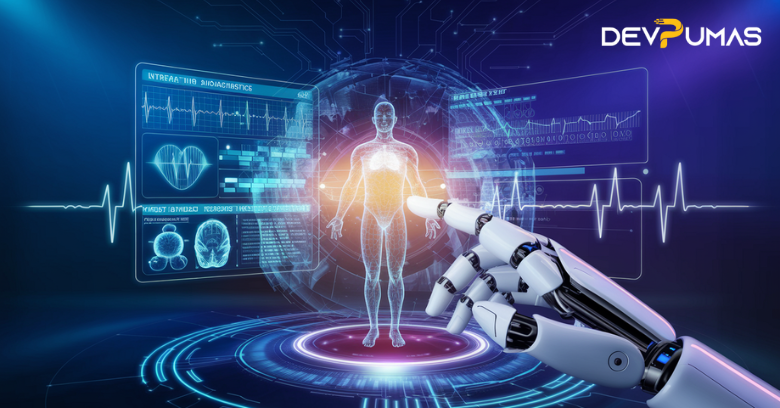Generative AI is revolutionizing the healthcare industry by enhancing patient care, streamlining diagnostics, and improving operational efficiency. This article delves into the transformative impact of generative AI in healthcare, highlighting its applications, benefits, and the future landscape of medical technology.
Table of Contents
- Introduction to Generative AI in Healthcare
- Enhancing Diagnostics with Generative AI
- Personalized Treatment Plans
- Streamlining Administrative Tasks
- Advancements in Medical Imaging
- Drug Discovery and Development
- Patient Engagement and Education
- Ethical Considerations and Challenges
- Future Prospects of Generative AI in Healthcare
- Conclusion
1. Introduction to Generative AI in Healthcare
Generative AI refers to algorithms that can generate new content, such as text, images, or audio, by learning patterns from existing data. In healthcare, generative AI is being utilized to create innovative solutions that enhance patient outcomes and optimize clinical workflows. The integration of generative AI in healthcare is paving the way for a more efficient and personalized medical experience.
2. Enhancing Diagnostics with Generative AI
Generative AI models analyze vast datasets to identify patterns that may be imperceptible to human clinicians. This capability enhances diagnostic accuracy and early disease detection.
Applications:
Cancer Detection: AI tools predict cancer risk by analyzing patient symptoms and medical records, aiding in early diagnosis.
Prostate Cancer: AI assists in identifying biomarkers to predict disease progression, enabling personalized treatment plans.
3. Personalized Treatment Plans
Generative AI facilitates the development of tailored treatment strategies by analyzing individual patient data, including genetics, lifestyle, and environmental factors.
Benefits:
Customized Therapies: AI models predict patient responses to various treatments, allowing for more effective and personalized care plans.
Adaptive Treatment Strategies: Continuous learning from patient data enables AI to suggest modifications to treatment plans in real-time, improving outcomes.
4. Streamlining Administrative Tasks
Administrative burdens in healthcare can lead to inefficiencies and increased costs. Generative AI addresses these challenges by automating routine tasks.
Applications:
Insurance Appeals: AI tools generate automatic health insurance appeal letters, countering denials decided by automated algorithms.
Documentation: AI systems assist healthcare providers in collecting medical histories by engaging with patients in understandable language, enhancing the efficiency of information collection and reporting.
5. Advancements in Medical Imaging
Generative AI enhances medical imaging by improving image quality and aiding in the interpretation of complex scans.
Applications:
Image Reconstruction: AI algorithms reconstruct high-quality images from low-dose scans, reducing patient exposure to radiation.
Anomaly Detection: AI models detect subtle anomalies in imaging data, facilitating early diagnosis of conditions like tumors or vascular diseases.
6. Drug Discovery and Development
The pharmaceutical industry benefits from generative AI by accelerating the drug discovery process and reducing costs.
Applications:
Molecule Generation: AI models generate novel molecular structures with desired properties, expediting the identification of potential drug candidates.
Predictive Modeling: AI predicts how new compounds will interact with biological targets, streamlining the preclinical testing phase.
7. Patient Engagement and Education
Generative AI enhances patient engagement by providing personalized information and support.
Applications:
Chatbots: AI-powered chatbots offer patients instant responses to health-related queries, improving access to information.
Educational Content: AI generates tailored educational materials to help patients understand their conditions and treatments.
8. Ethical Considerations and Challenges
While generative AI offers numerous benefits, it also presents ethical challenges that must be addressed.
Concerns:
Data Privacy: Ensuring patient data confidentiality is paramount, requiring robust security measures.
Bias and Equity: AI models must be trained on diverse datasets to prevent biases that could lead to health disparities.
Transparency: Clear understanding of AI decision-making processes is essential for clinician and patient trust.
9. Future Prospects of Generative AI in Healthcare
The future of generative AI in healthcare is promising, with ongoing research and development aimed at expanding its applications.
Potential Developments:
Real-Time Diagnostics: AI systems capable of providing instant diagnostic insights during patient consultations.
Robotic Surgery: Integration of AI in surgical robots to enhance precision and outcomes.
Predictive Analytics: Advanced AI models predicting disease outbreaks and patient deterioration, enabling proactive interventions.
10. Conclusion
Generative AI is transforming healthcare by improving diagnostics, personalizing treatment plans, streamlining administrative tasks, and advancing medical research. As technology continues to evolve, the integration of generative AI in healthcare holds the promise of a more efficient, effective, and patient-centered medical system.




